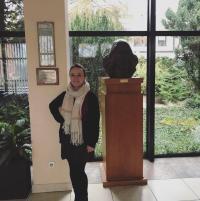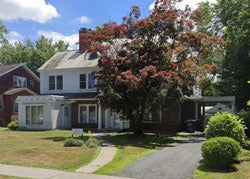
Emily Kosmaczewski is a doctoral candidate at the Astronomical Observatory at Jagiellonian University in Krakow, Poland. She received her bachelor’s of Applied Physics and Aerospace Science in 2016 and master’s of Astronomy in 2017, both from Rensselaer Polytechnic Institute in Troy, New York. Following her master’s, Emily was awarded a Fulbright Research Fellowship for the 2017-2018 academic year at Jagiellonian University in the department of High Energy Astrophysics where she would ultimately enroll in doctorate studies in 2018. Currently Emily is an active member of the Fermi-Lat collaboration and is pursuing a multi-wavelength thesis study of a pre-starforming region, working in infrared, x-ray, and gamma-ray energies, with a completion date for her PhD in September 2022.
Where did you do your Fulbright and what was the purpose of the grant?
My Fulbright fellowship was at the Astronomical Observatory of Jagiellonian University. I worked in the Department of High Energy Astrophysics studying the nature of radio galaxies. A radio galaxy is a type of galaxy that has an active black hole in the center which results in huge plumes (or jets) of gas that shine very brightly in the radio band. These galaxies are believed to be a phase of galaxy evolution that can reoccur many times, and so we studied very young radio galaxies (those with very small radio jets) to try and better understand how this phase begins, what causes it, and why does it stop. We ultimately published our results in the Astrophysical Journal in 2020, titled “Mid-infrared Diagnostics of the Circumnuclear Environments of the Youngest Radio Galaxies”. [see Kosmaczewski et al. (2020)].
How did you engage with the local people?
During my Fulbright, I got involved in a lot of activities. I joined a local theater, took swing and blues dance classes, as well as I was an active member of the U.S. consulate’s outreach programs (still am!). Some of my favorite memories were those events, reading to school children or talking to high school students about American customs (such as Thanksgiving). I found the best way to engage with a foreign culture was to be open to any opportunities that presented themselves. I gave talks all over Poland traveling to many cities to talk not only about science, but being a woman in stem and American culture as well.
What was the most rewarding aspect of your Fulbright experience?
The most rewarding part of my Fulbright (and I think for many other Fulbrighters as well) was the people I got to meet. As part of my Fulbright I was able to travel all over Poland and meet researchers from many different fields. The university was very supportive of me traveling and sent me to conferences in Germany and Italy where I got to meet researchers and hear about the incredible research being performed in different branches of Astronomy.
What surprised you the most?
How kind people were. I went to Poland with little mastery over the language, and even though I tried to learn as much as possible, Polish is a very difficult language. The thing that surprised me the most was how nice the Polish people were about my awful language skills. They were happy to see me try and it encouraged me to speak in Polish even if I knew it was barely intelligible.
How did you prepare in the year/months prior to departure?
Once I heard I received the Fulbright fellowship, I was so excited. We got our notifications in March and were due to arrive in September. I spent the months prior to leaving doing everything possible to be prepared. This was my first trip out of the USA and so I wanted to do as much research as possible, from getting my passport to investigating Polish customs and traditions, I did a lot to prepare myself. However, no amount of preparation will cover anything, for me I was surprised to find that bags at the grocery store weren’t common and you had to pay for them if you needed one, and smiling at strangers on the street will get you more than one strange looks. It was an adjustment but the research I did before hand made the transition significantly easier.
How were you received as an American?
I was the first native English speaker in the observatory at Jagiellonian, and as such everyone was so excited to have someone to practice their language skills with. Everyone was very welcoming and all my new friends outside of work wanted to know everything about living in America.
How has this experience impacted you beyond your return to the U.S.?
First, I ended up deciding to stay in Poland to pursue my Phd. I hadn’t expected to enjoy working with my department so much, and to fit in so quickly to a foreign country. My Fulbright was a stepping stone for me that led to an incredible amount of opportunities and a network of collaborators from all over the world. The second thing my Fulbright experience gave me was a sense of confidence that I never had before. It made me more secure in my research and gave me the courage to pursue more opportunities outside my comfort zone.
What advice do you have for students considering applying?
Start early! The best advice I can give is to start your application as early as possible. Give yourself plenty of time to find a host institute that really works for you, having a Fulbright mentor who is a good fit for you can improve your experience ten fold. I would also say to get many eyes on your application, to help you review your answers.
The Fulbright U.S. Student Program provides year-long awards for research, study, or English Teaching Assistant positions abroad.
